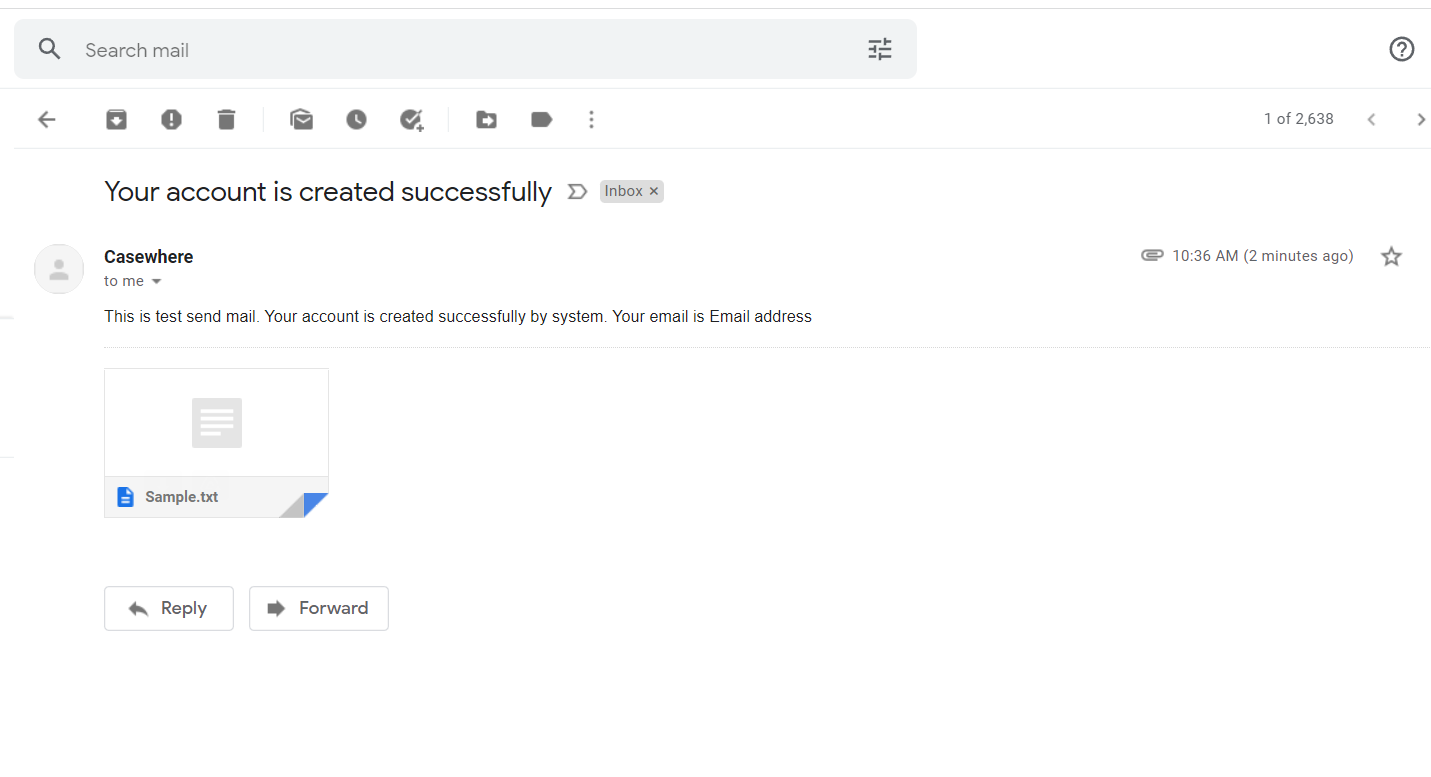Plugin: SMTP
Introduction
SMTP plugin allows you to send email via SMTP, which means you can easily integrate it into an existing SMTP server by minor modifications in the SMTP plugin configuration.
Features
Send an email
There is one method here to allow the user to send an email from Casewhere to the external system.
Method Name: SendEmail
Input
- subject: The email's subject. This field is required.
- body: The email's content, it can be plain text or text with HTML format. This field is required.
- to: The list of recipient email addresses in the serialized JSON format. This field is required.
- cc: The list of CC email addresses in the serialized JSON format. This field is optional.
- bcc: The list of BCC email addresses in the serialized JSON format. This field is optional.
- isHtml: Field value is either true or false (false is default), it supports display HTML in content email. This field is optional.
- If
true, the email's content displays with HTML format - If
false, the email's content doesn't display with HTML format although it contains HTML
- If
- attachments: the serialized JSON string of attachments. This field is optional.
Follow the below sample:
var bytes = Encoding.ASCII.GetBytes("text");
var attachments = new List<Dictionary<string, string>>();
attachments.Add(new Dictionary<string, string>
{
{ "Name", "text.txt" },
{ "Content", Convert.ToBase64String(bytes, 0, bytes.Length) }
});
var mailParameters = new Dictionary<string, string>()
{
{ "subject", "Subject email" },
{ "body", "Content email" },
{ "isHtml", true },
{ "to", JsonConvert.SerializeObject(new List<string> { "casewhere@globeteam.com" }) },
{ "cc", JsonConvert.SerializeObject(new List<string> { "casewhere@globeteam.com" }) },
{ "bcc", JsonConvert.SerializeObject(new List<string> { "casewhere@globeteam.com" }) },
{ "attachments", JsonConvert.SerializeObject(attachments) }
};
This is sample email:

Use the Invoke method in IPluginApi to call SendEmail feature:
IPluginApi.Invoke(string pluginName, string methodName, IDictionary<string, Object> parameters)
Output
The method returns data with two fields IsSuccess, Error.
Example
var pluginApi = ctx.Use<IPluginApi>();
// Prepare parameters
var parameters = new Dictionary<string, string>()
{
{ "subject", "Subject email" },
{ "body", "Content email" },
{ "isHtml", "true" },
{ "to", JsonConvert.SerializeObject(new List<string> { "casewhere@globeteam.com" }) },
{ "cc", JsonConvert.SerializeObject(new List<string> { "casewhere@globeteam.com" }) },
{ "bcc", JsonConvert.SerializeObject(new List<string> { "casewhere@globeteam.com" }) }
};
// Invoke plugin
var pluginResult = pluginApi.Invoke("CWMail", "SendEmail", parameters);
var isSuccess = pluginResult.Value<bool>("IsSuccess");
Installation
Requirements
- Casewhere v2.6.0 or later.
Configuration
- Username: SMTP username.
- Password: SMTP password.
- EmailAddress: The sender's email address.
- DisplayName: The sender's name.
- SMTP: SMTP server name or IP address.
- Port: SMTP transactions's port
- EnableSsl: option to enable Secure Sockets Layer (SSL) in order to encrypt the connection. Value is
trueorfalse.
Example
{
"Username": "Username",
"Password": "Password",
"EmailAddress": "no-reply@application.com",
"DisplayName": "Sample application",
"SMTP": "application.com",
"Port": 587,
"EnableSsl": true
}
Releases
1.0.0 - 23/03/2022
Changelog
- Send an email.
Download (login required) SMTP plugin v1.0.1
Roadmap
- Send test email
- Previewing email
- Email mapping